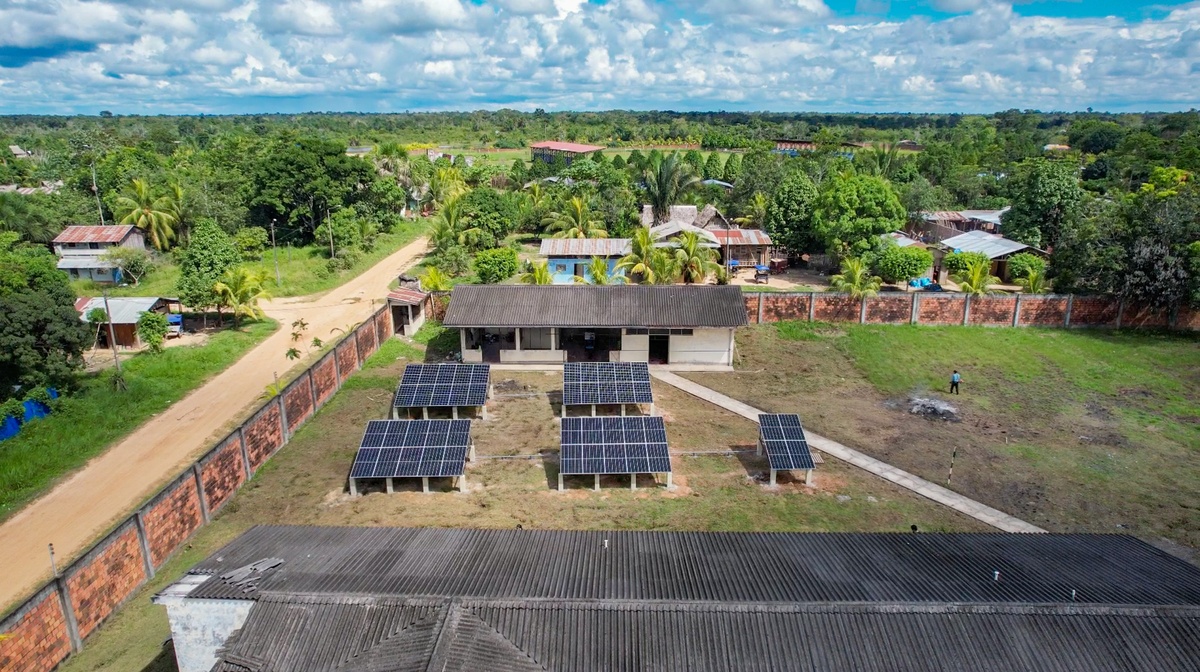How Solar Panels Are Supporting Care In Indigenous Communities In Peru
Partners In Health has installed over 200 solar panels nationwide
Posted on Oct 19, 2023

Ruth Vázquez once had to attend births by the light of a cell phone.
Now, the Masisea resident can use the facility lights 24/7, thanks to solar panels installed by Socios En Salud, as Partners In Health is known in Peru, and the Ministry of Health.
The solar panels are among more than 230 installed by Socios En Salud over the past year, equipping health centers with the electricity needed to power medical equipment and facilities even in the most rural areas.
The solar panels, installed in partnership with the United States Agency for International Development (USAID), come as part of Socios En Salud’s larger efforts to strengthen Peru’s health system.
Socios En Salud has worked in Peru since 1994, when it responded to a deadly outbreak of multidrug-resistant tuberculosis, saving hundreds of lives and inspiring the World Health Organization to update its treatment guidelines. In the decades since, Socios En Salud has expanded its work, in partnership with the Ministry of Health, to provide medical care and social support for thousands of people in Lima and beyond.
Much of that work has focused on communities historically and systemically marginalized.
Peru is home to more than 2 million people of indigenous descent. As COVID-19 surged in 2020, these communities were left behind, with health centers lacking staff, medication, and safety measures—if there were health centers at all.
Stable electricity is essential to patient care, enabling health workers to run medical devices like heart monitors, quickly heat water to disinfect surgical tools, and refrigerate medications and vaccines. At Partners In Health, utilities like electricity and running water are known as the “stuff” that make up strong health systems.
Electricity has been one of the major challenges for health centers in Masisea and Iparia, rural communities in the Amazon rainforest, reachable only by boat. More than 12,000 people live in these communities, representing 87 indigenous groups, such as the Asháninka and the Shipibo-Konibo. The poverty rate is as high as 14% in the region, which has also been impacted by drug trafficking and guerilla warfare.
At these health centers, generators were rundown and access to electricity was irregular, rendering key medical equipment and tools inoperable and putting patients and staff at risk. Staff constantly had to transport large quantities of fuel for generators, which was costly and far from a guarantee of electricity.
The unreliable electricity was especially dangerous for patients on oxygen. Most oxygen concentrators use around the same amount of electricity as a refrigerator. Mothers and newborns were also put at risk, without adequate lighting during births or a way to power medical equipment such as the ultrasound machine at Masisea Health Center–the only one in the entire region.
“We have attended births with cell phone flashlights when there’s been an emergency at night,” says Vázquez.
To respond to this urgent need for electricity, Socios En Salud installed 44 solar panels at Masisea Health Center and 48 at Iparia Health Center in June and July 2022, in partnership with USAID. Socios En Salud installed a total of 232 solar panels and 130 oxygen wall outlets last year throughout Peru.
Solar panels are a form of renewable energy, crucial in the midst of unprecedented climate change. More than 80% of the world’s energy comes from fossil fuels, which emit greenhouse gasses that contribute to global warming. Renewable energy such as solar is also more cost-effective in the long run.
To generate electricity, solar panels convert sunlight—plentiful in the Ucayali region of the Amazon rainforest—into electrical energy. The panels installed by Socios En Salud store this energy in a battery, ensuring electricity is available even on cloudy days. As part of its efforts to strengthen health systems sustainably and for the long term, Socios En Salud trained clinic staff on how to maintain the solar panels and their batteries.
Ever since the panels were installed, they’ve been powering the health centers in more ways than one.
“Now, patient demand is more regular,” says Mónica Córdoba Macuy, an obstetrician at Masisea Health Center. “Before it was not much.”
The stable, 24/7 electricity supplied by the solar panels has directly impacted care for at least 1,200 patients in Masisea.
“Now that they’ve put in solar panels for 24-hour lighting, that helped us a lot,” says Vázquez. “It’s the first time in my life since I was born that I’ve seen lights 24 hours a day.”

